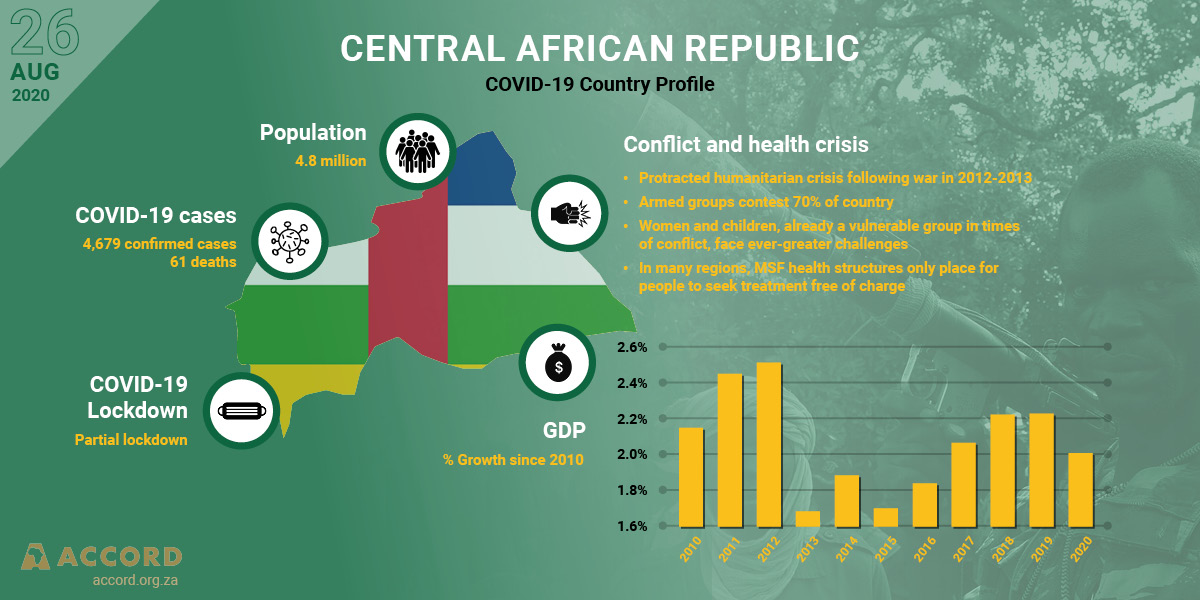The project aims to collaborate with youth-led organisations in CAR to research and document the lived realities and contributions of young women and men to peace processes, build on their knowledge and capacities, and create an environment that is conducive to their full participation in the ongoing peace efforts.
Despite their significant numbers (60% of the population), young people in the Central African Republic (CAR) remain largely under-represented and excluded as partners in decision-making processes, and their contributions to peace are often overlooked.
Tweet
Considering the short time frame and urgency of implementing the key pillars of the Political Agreement for Peace and Reconciliation (APPR-RCA) and the National Recovery and Peace Consolidation Plan, and taking into consideration the upcoming elections and the measures to contain COVID-19, this project is time sensitive and seeks to ensure that youth are meaningfully represented and included in the continuing peace processes.
The project has three interrelated outcomes. The first outcome is to contextualise – through a rigorous study carried out in three prefectures – the trajectories of conflicts, the challenges, the opportunities and the trends regarding the inclusion of young people in the country’s peace processes. Through a pilot Participatory Action Research (PAR) study, the project will ascertain how conflict drivers affect young women and men, and how youth engage with peace at the community level. The PAR reinforces peer networks and shifts power dynamics in that it creates the opportunity for youth to ‘claim’ spaces, exercise their agency and own the research project.
Furthermore, a mapping of impactful youth-led initiatives is being carried out in the three zones, and their impact will be assessed qualitatively to capture lessons learnt and best practices. Based on the assessment, a documentary will be produced – the goal of which is to spotlight the positive contributions of young women and men at the grassroots level, as well as to challenge negative stereotypes around youth.
Both the PAR and the mapping had to be adapted to comply with the conditions introduced to contain COVID-19, to prevent this initiative from spreading the coronavirus.
The second outcome complements the findings of the research component with a more policy-embedded approach. This aims to ensure that youth participation in peace processes is addressed at the policy level and that formal and informal engagement mechanisms are put in place to strategically link youth to decision-making processes.
Based on the research results and through a series of consultations with key partners – government, parliament, civil society organisations (CSOs), youth-led organisations and women associations – the project aims to develop an operational framework that will delineate a set of levers to assist decision-makers in analysing issues and identifying policy responses to effectively address the issue of youth exclusion. The framework will also serve as an indicative roadmap that will be reviewed and refined as more data emerges.
The third outcome seeks to contribute to strengthening the capacities of youth-led organisations and associations. The project will also provide mentorship and coaching through internship and mentorship schemes, and will connect the project’s young beneficiaries to regional and continental youth networks to ensure that the mentorship component extends beyond the project’s lifespan.
By placing emphasis on the full participation of young women and men in decision-making and peace processes, the project complements the PBF portfolio in CAR, and aligns with government priorities as stipulated in the National Recovery and Peace Consolidation Plan and the APPR-RCA.
Following in-country consultation, the National Council of Central African Youth (CNJCA) and URU – a local youth-led organisation that supports, promotes and develops the role of youth in CAR – were selected as key implementing partners. The CNJCA serves as a bridge between youth organisations and government authorities, and represents an umbrella of youth organisations and networks across the country.
URU, in partnership with ACCORD (and with COVID-19 measures in place), has trained 30 youth to carry out PAR in three prefectures: Ombella-M’Poko, Ouaham and Ouaka. A total of 883 young women and men were interviewed and consulted over the course of two months. The studyfills a critical research and capacity-building gap, since quantitative and qualitative data on youth in CAR is limited. Such in-depth research on youth, by youth, was vital to design evidence-based policies and programmes that take into account the actual needs and priorities of young women and men, as well as reflecting their diverse perspectives on peacebuilding. The report of this study was validated by the government and implementing partners, and presents avenues for reflection on areas of intervention targeting the issue of youth inclusion in peace processes in CAR.
In conclusion, the commitment to involve youth in the critical aspects of the peace process in CAR has been validated by the work done thus far through this project. The significance of a collaborative approach to implementing peacebuilding is demonstrated by this project leveraging on ACCORD’s existing partnerships with the government, thus ensuring that key ministries and structures of the APPR-RCA are involved in the implementation. In addition, partnering with already existing local youth organisations in CAR enhances opportunities for the sustainability of the project beyond its time frame.
Edouard Cishahayo is a project coordinator at ACCORD, based in the Central African Republic (CAR) Country Office. Samah Osman is a project manager at ACCORD, based in the Durban headquarters.

